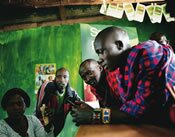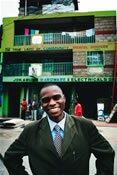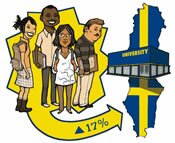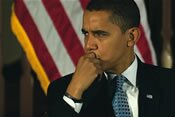Inflight Magazine of Brussels Airlines
Welcome to the Inflight Magazine of Brussels Airlines
Business trends
Our round-up of what’s happening in the business world across Europe
Baby, its cold outside
 Birthrates traditionally rise during economic recessions, which can only be good for baby goods retailers and the estate of Barry White. As we await cheering news from the survivors of the Walrus of Love, Mothercare has reported its half-yearly profits have doubled due to its international and online divisions, and that it will continue to expand globally.
Birthrates traditionally rise during economic recessions, which can only be good for baby goods retailers and the estate of Barry White. As we await cheering news from the survivors of the Walrus of Love, Mothercare has reported its half-yearly profits have doubled due to its international and online divisions, and that it will continue to expand globally.
The company, which is based outside London and has almost 1,000 shops worldwide, posted pre-tax profits of €11.1m for the six months to 11 October – up an incredible 94% on the same period last year. Chief executive Ben Gordon told reporters the group was trading well, despite weaker consumer confidence and the expectation of a prolonged economic slowdown.
Mothercare’s international business grew profit by a record 59%, while online and catalogue business sales rose by 29%. Mothercare says that, although the second half will be tough, it will still be able to deliver growth as it continues its expansion throughout the Middle East and Asia.
Moreover, the company says its first two joint venture stores in China have been trading well and that it plans to open a further 10 stores there soon (even more, presumably, if it can patent a melamine-testing kit for baby milk) and 40 in Russia. It also plans to increase its presence in India by another 100 stores within three years.
GROWING GAINS A SURE FOOTING
 German sportswear giant Puma has defied the sagging economy to raise its full-year sales forecast from “single-digit to mid to high single-digit growth”, buoyed by a 4.7% overall increase in its order books. “We are confident that Puma will achieve another year of solid growth in 2008, despite the global financial crisis,” CEO Jochen Zeitz told analysts during a conference call. He added it would be the Frankfurt-listed firm’s 14th consecutive year of growth. Footwear advance orders were up 6.8% to €703.5m during ‘Black September’ – the company’s second best month ever – suggesting either Puma’s sponsorship of Usain Bolt, the world’s fastest human, in Beijing had paid off or that Lehman Brothers’ directors were planning to flee on foot. Puma also moved into the sailing market by competing in the Volvo Ocean Race, a nine-month round-the-world marathon which will finish in July.
German sportswear giant Puma has defied the sagging economy to raise its full-year sales forecast from “single-digit to mid to high single-digit growth”, buoyed by a 4.7% overall increase in its order books. “We are confident that Puma will achieve another year of solid growth in 2008, despite the global financial crisis,” CEO Jochen Zeitz told analysts during a conference call. He added it would be the Frankfurt-listed firm’s 14th consecutive year of growth. Footwear advance orders were up 6.8% to €703.5m during ‘Black September’ – the company’s second best month ever – suggesting either Puma’s sponsorship of Usain Bolt, the world’s fastest human, in Beijing had paid off or that Lehman Brothers’ directors were planning to flee on foot. Puma also moved into the sailing market by competing in the Volvo Ocean Race, a nine-month round-the-world marathon which will finish in July.
This year, Puma is continuing to reinforce its riskier lifestyle positioning. Following collections with designers Alexander McQueen and Yasuhiro Mihara, Puma has teamed up with PPR stablemate Italian luxury brand Sergio Rossi for a “capsule women’s collection” that’s said to re-interpret the brand’s iconic Clyde sneaker, introduced in 1973. Meanwhile, the first designs by Britain’s Hussein Chalayan, Puma’s creative director and founder of the fashion label that Puma acquired a majority stake in last February, will be released soon.
COME IN, MR BOND, PLEASE
 Perhaps the biggest winner from the success of the Bond film Quantum of Solace is Tom Ford, whose eponymous label provided all Daniel Craig’s clothes, including a tuxedo in midnight blue with a classic shawl collar and the eBay-baiting Limited Edition 007 TF108 sunglasses. But what of the fortunes of Milan-based Brioni, which dressed the previous Bond, Pierce Brosnan, from 1995 to 2002 as well as Craig in his 007 debut Casino Royale? Well, put it this way: Brioni sure could use some James Bond heat.
Perhaps the biggest winner from the success of the Bond film Quantum of Solace is Tom Ford, whose eponymous label provided all Daniel Craig’s clothes, including a tuxedo in midnight blue with a classic shawl collar and the eBay-baiting Limited Edition 007 TF108 sunglasses. But what of the fortunes of Milan-based Brioni, which dressed the previous Bond, Pierce Brosnan, from 1995 to 2002 as well as Craig in his 007 debut Casino Royale? Well, put it this way: Brioni sure could use some James Bond heat.
The family company reportedly hopes to offload a 25% stake in Brioni to pay down debt and diversify as demand for its high-end suits falls off. Andrea Perrone, one of Brioni’s three co-chief executives, said the company is keen to quickly pay down a loan from Milan-based Interbanca and buy a few smaller companies, such as leather-goods makers, which could help it enter the accessories market. Last year Brioni, high on Casino Royale, actually turned down advances from several private equity firms. Analysts say the company, which values itself at €500m, will now struggle to attract private equity as the credit crunch hits the luxury retail sector. Prada, Roberto Cavalli and Salvatore Ferragamo have all recently put flotations on the back burner.
NOT REALLY… A reality TV show
 Mads Kjaer, founder of Copenhagen-based MyC4.com, has just announced that: “Investor number 10,000 has joined our fight to end poverty through business.” Through Kjaer’s website, investors make loans – of usually less than €100 – to businesses in Africa.
Mads Kjaer, founder of Copenhagen-based MyC4.com, has just announced that: “Investor number 10,000 has joined our fight to end poverty through business.” Through Kjaer’s website, investors make loans – of usually less than €100 – to businesses in Africa.
There is detailed information about the entrepreneurs seeking finance, in most cases owners of small businesses such as Ugandan leather craftsman Herbert Kagyesera, who is seeking a loan to buy machinery, or Kenyan fashion retailer Milkah Muhambe who wants to buy more stock. Under the scheme, investors upload money  into their accounts, select businesses and then bid to offer a loan at a particular interest rate. Recipients repay them in monthly instalments. ‘Providers’ on the ground screen the businesses and upload the details to the MyC4 site.
into their accounts, select businesses and then bid to offer a loan at a particular interest rate. Recipients repay them in monthly instalments. ‘Providers’ on the ground screen the businesses and upload the details to the MyC4 site.
“African business doesn’t want charity,” insists Kjaer. “Africa is not a nutcase – it’s a business case. It’s ironic that we’re putting plans together for billions of dollars for Western banks, but the rescue plan for developing countries is peanuts.” The MyC4 model is based on the theory of microfinance, popularised by Nobel prize-winner Muhammad Yunus, whose Grameen Bank in Bangladesh has provided microcredit to 7.45 million borrowers. Kjaer is hoping to tap into the small and medium-sized enterprise market, where the average loan is €1,600. He says that, once a loan has been repaid and profits realised, almost all investors re-invest their money into new enterprises.
UPGRADE YOUR TRIP
ROOM DISSERVICE
 Just stayed at a lousy hotel? Be careful who you tell in these jittery times. The latest trend from the US is travel-site-posting related lawsuits. A centre in Florida called the Strax Rejuvenation and Aesthetics Institute is suing a woman over an 11-sentence review that was posted on the Citysearch website, and the Grand Palms Golf & Country Club in Pembroke Pines is suing a woman for a similarly negative review. “These suits are extremely common and are making their way through the courts,” Lyrissa Lidsky, professor at the University of Florida, told the Florida Sun-Sentinel. “Courts are starting to develop balancing tests to guarantee it’s a legitimate libel suit before they uncover the poster’s identity.”
Just stayed at a lousy hotel? Be careful who you tell in these jittery times. The latest trend from the US is travel-site-posting related lawsuits. A centre in Florida called the Strax Rejuvenation and Aesthetics Institute is suing a woman over an 11-sentence review that was posted on the Citysearch website, and the Grand Palms Golf & Country Club in Pembroke Pines is suing a woman for a similarly negative review. “These suits are extremely common and are making their way through the courts,” Lyrissa Lidsky, professor at the University of Florida, told the Florida Sun-Sentinel. “Courts are starting to develop balancing tests to guarantee it’s a legitimate libel suit before they uncover the poster’s identity.”
Grand Palms reportedly filed suit in October against Jessica Rapillo, accusing the New Yorker of posting a defamatory review that caused a noticeable drop in business. The Sentinel article quotes Lidsky as warning that: “Anonymity on the internet is not guaranteed.” Businesses can subpoena service providers to track down who wrote a review, she said. So, if you really, really hate a hotel, it might almost be safer to simply trash the room before you check out.
WHY ARE WE HERE? Enjoying Tsar treatment
 Anyone who feels like rubbing a caviar exfoliant into the face of the global economic meltdown will be cheered by next month’s opening of the Barvikha Hotel & Spa in the Barvikha Luxury Village in Rublyovka, the suburb dubbed the Beverly Hills of Moscow. Conceived by Antonio Citterio, creator of the Bulgari Hotels, Barvikha’s 65 rooms feature private terraces, Frette bed linens and marble baths. Its main restaurant, serving Russian cuisine, is overseen by chef Anatoly Komm. The wellness centre has 14 treatment cabins plus a restaurant serving organic, vegetarian dishes. The bling isn’t even toned down while guests tone up: the workout room has a Citterio-designed Kinesis Personal exercise machine, which is one of only 100 made. www.barvikhahotel.com
Anyone who feels like rubbing a caviar exfoliant into the face of the global economic meltdown will be cheered by next month’s opening of the Barvikha Hotel & Spa in the Barvikha Luxury Village in Rublyovka, the suburb dubbed the Beverly Hills of Moscow. Conceived by Antonio Citterio, creator of the Bulgari Hotels, Barvikha’s 65 rooms feature private terraces, Frette bed linens and marble baths. Its main restaurant, serving Russian cuisine, is overseen by chef Anatoly Komm. The wellness centre has 14 treatment cabins plus a restaurant serving organic, vegetarian dishes. The bling isn’t even toned down while guests tone up: the workout room has a Citterio-designed Kinesis Personal exercise machine, which is one of only 100 made. www.barvikhahotel.com
ECO FASHION
 Amancio Ortega, founder of the Intidex fashion empire and world’s biggest retail chain Zara, reportedly intends to invest more than €2bn in creating a global alternative energy network. Ortega is Spain’s richest man and, after investing billions in real estate and banking, has clearly decided it makes far more sense to simply throw his money to the wind.
Amancio Ortega, founder of the Intidex fashion empire and world’s biggest retail chain Zara, reportedly intends to invest more than €2bn in creating a global alternative energy network. Ortega is Spain’s richest man and, after investing billions in real estate and banking, has clearly decided it makes far more sense to simply throw his money to the wind.
In 2009, his new venture Ortega Capital Energy plans to start building a whole slew of wind farms, plants for the production of biofuels and solar energy arrays. Over the past year, Capital Energy has set up solar plants around Madrid – creating 10 different subsidiaries to take full advantage of alternative energy subsidies – and has already established a presence in Latin America, East Europe and India. However, the grand plan now is to attract €100m in private capital in Europe. Projects include four biofuel plants using soya, rape seed and palm fibre in Seville, Bilbao, Cartagena and Cadiz. A gigantic solar plant is also being planned in Castilla-Leon, north of Madrid, for 2011.
DRAWING BOARD Money matters
While bankers are now largely regarded with more disdain than politicians or estate agents for devising the opaque products that caused the financial meltdown, so-called ethical banking appears to be flourishing. Take the Netherlands-headquartered Triodos, which says it invests only in green, social and cultural projects. The Brussels branch of Triodos opened an average of 60 new accounts a day in October – five times the usual figure, its managing director Oliver Marquet told Reuters. “We started seeing something unusual in July… it accelerated in September, and accelerated even further in October with the crisis at Fortis and Dexia,” he said. Belgium’s largest bank, Fortis, was carved up by Benelux authorities that same month after a cash injection failed to calm investor nerves. Another Belgian bank Dexia also received state help.
The ethical banks say deposits and clients go up in times of financial turmoil because they’re transparent and invest in tangible projects rather than derivatives. The Brussels branch of Triodos now has some 28,000 clients, even though returns aren’t that attractive in purely financial terms. It may simply be that we have less trust in banks, rather than more interest in ethics.
Traffic report
 Swedish lessons
Swedish lessons
Anyone who thinks that Sweden only trains people to make flat-pack furniture or placemats out of felt may be surprised to learn that the number of foreign students studying at Swedish colleges continues to climb to record levels. Astonishingly, last academic year, one quarter of all new students at Swedish institutes of higher education came from abroad and Sweden’s National Agency for Higher Education says foreign student enrolment was up 17% for the current academic year. Moreover, foreigners make up about 43% of the increase in new students enrolled in Swedish universities over the past two years.
Most are enrolling in technical courses, too. Stockholm’s Royal Institute of Technology has about 3,000 foreigners out of 13,400 full-time students.
At the same time, Statistics Sweden has just reported that Sweden’s population increased by nearly 60,000 residents in the first nine months of 2008, with immigrants accounting for more than 70% of the increase. What’s more, growing numbers are
choosing to live in university towns rather than in cities known for their large immigrant populations. Solving this riddle is clearly a job for Henning Mankell – or it would be if the best-selling mystery writer didn’t live half the year in Mozambique.
POLITICAL SPY
Brigid Grauman snoops around in Brussels’ corridors of power
Although Brussels is predominantly French-speaking, it’s English that’s its lingua franca. Well over a third of its inhabitants say English is the second language they’re most comfortable using, with Dutch coming in at around a quarter. Now the Flemish Liberal party Open VLD is even suggesting that English should become the city’s official third language.
Philippe Van Parijs, professor of economics and social ethics at UCL and Harvard, says it makes absolute sense to increase the official use of English in the capital of Europe and the whole of the Brussels region. “You can’t expect Hungarians, Russians or Finns to learn French or Dutch when their working language in the European institutions is English,” he says. On the other hand, he believes: “We should tell Europeans that Brussels is their capital, but that Belgium is not their colony.”
He cites the example of an American in the cosmopolitan suburb of Waterloo who complained that, after three years, his landlord still didn’t speak English. “As a rule, immigrants have two attitudes to the local language,” says Van Parijs. “There are those who move somewhere and pick up the language of their new home with more or less difficulty.
And there are those who expect the local tribe to adapt to their own supposedly superior language.”
Van Parijs is convinced that English has to be used for advanced research in universities all over Europe if it is to avoid a brain drain to English-speaking universities. So a bit of common sense and a dash less arrogance, please.
The good, the bad & the worried
 Barack Obama’s victory is dividing Commission officials into three camps.
Barack Obama’s victory is dividing Commission officials into three camps.
The first, and probably largest, think that transatlantic relations will improve and that the days of the Bush administration’s silly rows (providing air-passenger details) and serious arguments (trade and farm subsidies) will be a thing of the past. In the second camp are “realists” who say that nothing much will change and that American politics won’t shift away from defending American interests. Europe and the US, they point out, are in economic competition. The third camp – mostly top Commission officials – worry that things may get worse. Their thinking is that, as the recession turns into a depression, things will grow very nasty, with more competition between financial centres and rows about bank regulation, climate change, Iran, Iraq and China. A Democratic Congress, they fear, may be increasingly protectionist, and that isn’t good news for Europe.
Eurosceptic in the hot seat
The Czech Republic took over Europe’s rotating six-month Presidency from France on 1 January, and European officials are tearing their hair out. It doesn’t take a big country to run a good Presidency, they say, pointing at Slovenia’s very honourable spell in the chair, but what they know about the Czechs isn’t encouraging. It’s the country’s first time in the EU Presidency’s chair and the world as seen from Prague is certainly different to the view from Paris.
Czech politics are notoriously volatile and tricky. On top of that, the country’s president and former prime minister Vaclav Klaus is an unrepentant and vociferous Eurosceptic who’d like to see the EU disappear in a puff of smoke, to reappear as no more than a loose trading zone. The only good news is that his office in the commanding heights of Prague Castle is more ceremonial than powerful. But he’s still capable of embarrassing the present Czech government and knocking the Presidency off course.
Oh dear, not another rerun
![]() José Manuel Barroso now looks pretty certain of gaining a second term as Commission President.
José Manuel Barroso now looks pretty certain of gaining a second term as Commission President.
His current term ends next autumn. If it is renewed, that will put him in the post for 10 years, as long as Jacques Delors. But Delors was made of far stronger stuff – undoubtedly a bit too strong for the tastes of today’s national governments.
People in Brussels are torn at the prospect of more Barroso. On the one hand, stability is appealing. On the other, rubber-stamping a not particularly charismatic small-country politician (he was Portugal’s prime minister for a while) doesn’t seem right when the Commission’s ability to act as the EU’s executive arm is fading away.
Barroso is charming, but he’s far from being a household name across Europe. Nor has he made any trouble for the big countries – Britain, France and Germany – and they apparently want to keep it that way. As for Barroso, he must be checking the days off on his calendar, because the longer no credible rival appears, the greater his chances.
Leave a Reply
